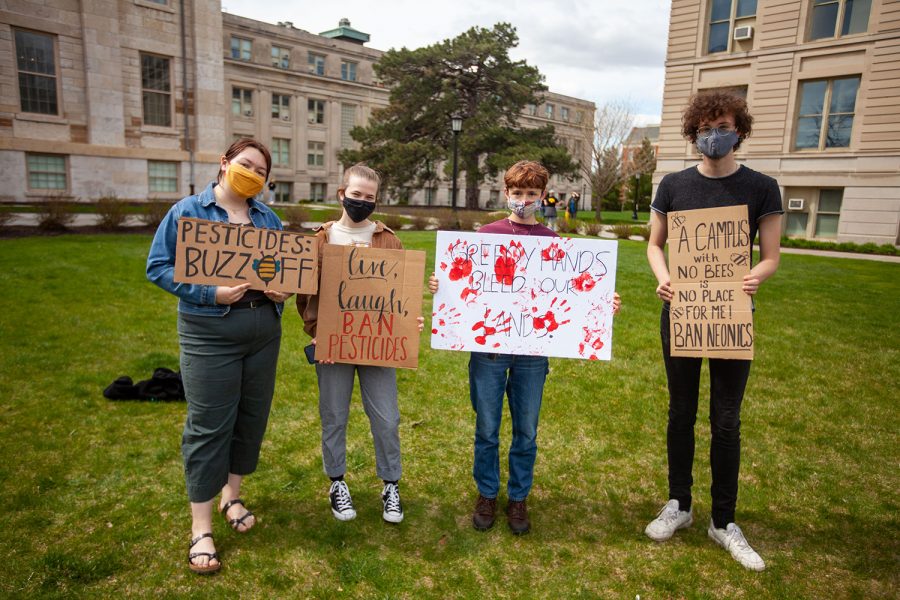Opinion | The University of Iowa needs to meet student demands for a pesticide-free campus
After years of ignoring the negative effects on student health and the environment, the university continues to use pesticides despite multiple calls for action.
University of Iowa Environmental Coalition members, Emily Jansen, Ella Hink, Claire Player and Joseph Haggerty (L-R), pose for a portrait on the Pentacrest on Friday, April 16, 2021. University of Iowa Environmental Coalition, along with 100 Grannies, protested pesticides and listed all the pesticides used on campus along with their health and environmental effects.
April 19, 2021
The University of Iowa Environmental Coalition, an ecological activist group on campus, has been advocating for the ban of pesticides since 1990. With goals to promote human and environmental health while encouraging native growth, this organization is fighting for the same thing in 2021: eliminating pesticide usage.
Now, the UI Environmental Coalition is focusing on increasing the size of posted signage on lawns where pesticides are sprayed, creating a Hawk Alert to warn students of spray, and overall pesticide reduction. One insecticide the UI recorded being used in 2018 is a neonicotinoid, which the European Union put a blanket ban on in 2018 for harm that they cause to bees.
Despite science-based reports, protests, and efforts to make positive change, this group’s demands have been pushed under the rug. A more recent effort by the University of Iowa Office of Sustainability and the Center of Health Effects of Environmental Contaminatio to research pesticide use on campus in 2019 recently released a report on the amount of types of pesticides used and how often, yet did not include information on health effects of interacting with pesticides. As years have passed, the university’s negligence and disrespect for Iowa City’s population has been silently distributed in the form of a toxic chemical spray.
Time spent outdoors is linked to positive physical and mental health benefits. But for UI students, it could also cause permanent damage and decline in their health.
The pesticides used are linked to multiple health issues. Their presence is related to increased risks of cancer, kidney and liver damage, cardiovascular diseases, reproductive and developmental effects, thyroid complications, skin irritation, difficulty breathing, and much more.
The university’s Pentacrest, an expansive grassy area surrounded by campus buildings, is the hub for student life. It is also sprayed with pesticides. Each day, students can be seen laying in the grass studying, having picnics with friends, playing frisbee, walking their dogs, and just enjoying time spent outdoors. Little do they know, in doing so they are exposing themselves to toxins.
As a student, I frequently use university provided outdoor spaces as an escape from long work hours indoors. Especially during the COVID-19 pandemic, this time spent outside has seemed like a healthy oasis. Learning I have put myself at risk just because I wanted to be outdoors is infuriating.
Students should be able to confidently be outside without compromising their health on account of the university’s careless actions.
Not only do the pesticides harm humans, but they also harm the environment. The chemicals threaten biodiversity through altering natural processes in plant and animal species and are often fatal.
It is impossible to control where pesticides go once sprayed. The chemicals drift easily, affecting non-targeted organisms such as aquatic life and crops through polluted waterways.
The pesticides on campus are linked to water pollution, increased cancer risk and kidney damage for mammals such as dogs, and a decline in bee, butterfly, and bird populations.
Despite all evidence of detriment, the university continues to use pesticides on campus. Its motivation? Creating an aesthetically pleasing campus experience.
Personally, I do not believe that weed-free, green lawns hold priority to the wellness of students and the environment.
Even though the university argues to be an environmentally conscious campus, the only thing green about what is happening here is the color of its lawns.
Much like the UI Environmental Coalition’s actions, it’s time for students to recognize the university’s actions and fight for a healthier, pesticide-free campus.
Columns reflect the opinions of the authors and are not necessarily those of the Editorial Board, The Daily Iowan, or other organizations in which the author may be involved.



